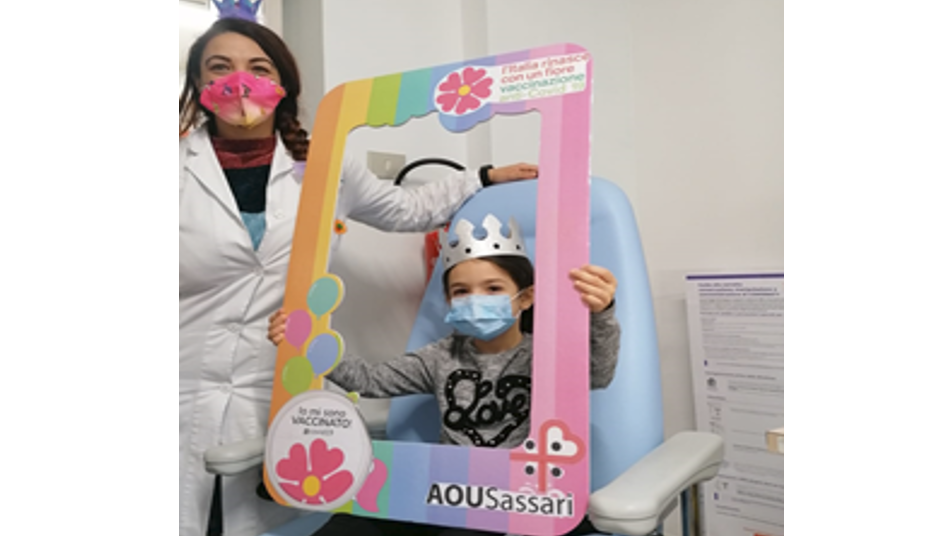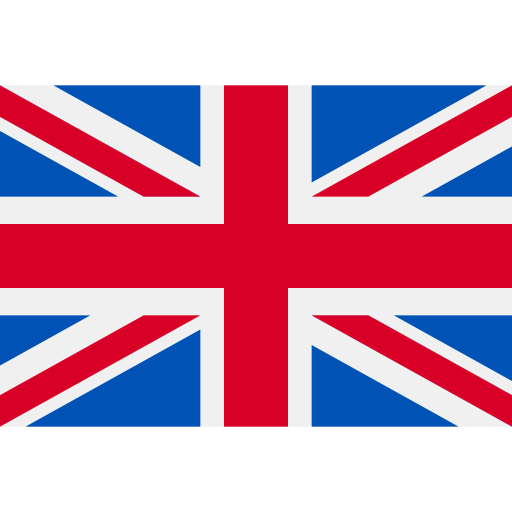The fight against COVID-19 continues: AOU-SS begins vaccinatinating children aged 5-11
Following the lead of Cagliari’s HUB, which began childhood vaccinations on December 16th, the Sassari University Hospital (AOU-SS) has started vaccinating children aged 5-11. Yesterday, Friday 7th January, the light-hearted atmosphere that encompassed the Viale San Pietro vaccination centre was also accompanied by a great sense of responsibility on the part of both parents and children. In total, 170 children aged between 5 and 11 received their first dose of the COVID-19 vaccine, despite only 60 appointments having been scheduled.

The devastating consequences of the COVID-19 pandemic have had a direct and indirect impact not only on the adult population and on society as a whole, but also on children, as a group and individually. These effects have been seen both in the clinical manifestation the disease and in the mental health, psycho-physical well-being and standard of education of the children who have experienced the pandemic during this long and as yet interminable two-year period.
The most up-to-date data and developments concerning the spread of the new variants of SARS-CoV-2 describe how, in this epidemiological phase, the spread of the virus is now affecting above all children of a school-going age. The rapid increase in the number of cases among this age group in recent weeks also shows that the closure of schools for the Christmas holidays has not had a decisive influence on the reduction in the number of cases, which mostly appear to originate intra-family, and therefore even containment measures such as distance learning would not be sufficient on their own to mitigate this increase.
This is even more worrying if one considers the fact that while acute infection with SARS-CoV-2 generally causes mild symptoms in children, the post-infectious manifestations, including the multisystem inflammatory syndrome temporally associated with SARS-CoV-2 (PIMS-TS) in childhood and 'Long Covid' (defined as the persistence of pathological symptoms such as fatigue, difficulty in concentrating, malaise, even three months after infection can impact on the overall physical and above all psychological well-being of the child), present an extremely complex clinical picture (COVID-19 in children. II: Pathogenesis, disease spectrum and management - https://doi.org/10.1111/jpc.15811 e The Burden of COVID-19 in Children and Its Prevention by Vaccination: A Joint Statement of the Israeli Pediatric Association and the Israeli Society for Pediatric Infectious Diseases - https://www.mdpi.com/2076-393X/10/1/81/htm).
This explains why, from the emergence of the "Delta variant" of the virus to the rampant spread of the "Omicron variant" in recent weeks, more and more children with COVID-19 have had to be admitted to hospital, with hospitalisations occurring most frequently in areas where vaccination rates were significantly low.
Vaccinating children in this age group could therefore mean a return, albeit in small steps, to the long-awaited normality, with less Distance Learning and fewer restrictions on extracurricular activities, allowing an adequate differential diagnosis and having undoubted advantages for family life. Moreover, vaccinating children, by increasing protection for friends, relatives and school staff with whom they come into contact, even indirectly, protects those who, due to particular health conditions (e.g. deficient immune defences, underlying chronic diseases), are at risk of developing serious forms of the illness.
Vaccination, therefore, is once again the main life-saving weapon at the disposal of science and the population as a whole to combat the pandemic and is a right in childhood just as it is in adulthood.
In Dececember last year, many Italian Regions (Emilia Romagna, Liguria, Lombardy, Tuscany, Basilicata, Lazio, Abruzzo, Campania, Puglia, Sardinia) carried out the first vaccinations in 5-11 year-olds. A reduced dose of the Comirnaty vaccine Pfizer/BioNTech is used. This is equal to one third of the dose authorised for adults and adolescents, and has a specific formulation; the second dose is to be administered at 21 days. In addition, according to the Ministerial Circular of 7 December 2021 - Extension of the indication for use of the Comirnaty vaccine (BioNTech/Pfizer) for the 5-11 age group, in severely immunocompromised children the cycle may be completed with an additional dose at least 28 days after the second inoculation (Annex 1). The Italian Medicines Agency underlined the high safety profile of the paediatric vaccine, as shown by the data currently available and derived from the US drug vigilance database relating to approximately 3.3 million children aged 5-11 years already vaccinated and for whom no evidence of warning signs are reported.
Following the launch on 16 December with more than 2,600 bookings and 300 vaccinated on the first dedicated Open Day at the Cagliari Fair Congress Centre, the anti-COVID-19 childhood vaccination also began the Sassari University Hospital(AOU-SS) yesterday, 7th January.
The number of doses administered at the AOU vaccine centre in Sassari was higher than expected: 170 children and their parents showed up, compared to the 60 booked in for childhood COVID-19 vaccinations, and everyone was welcomed in a serene and festive atmosphere. Balloons, banners, lots of candy and some small novelty gadgets were presented by doctors, nurses and administrative staff to the children who, showing courage and and a sense of responsibility, accompanied by their parents, underwent vaccination.

"Appointments were made for 60 children on the ministerial platform, but," says Dr Antonello Serra, who, together with Professor Paolo Castiglia, coordinates vaccinations at the AOU, "we welcomed all those who showed up, within the limits of time and doses that we had available, to then carry out the second administration in 21 days. So we decided to make an effort to accommodate everyone," continues the specialist, "because COVID-19 can also be dangerous for children, when we consider that nationwide hospitalisations in children have doubled in the last week. The vaccine is safe and effective and offers over 90% protection against the disease. As such, vaccinating children is a service to the community, because reducing the spread of the virus in schools makes the general environment safer".
The Vaccinarsinsardegna.org team was also present at the vaccination centre in Viale San Pietro. The team, which is part of the Hygiene and Control of Hospital Infections unit headed by Professor Paolo Castiglia, together with doctors in specialist training in Hygiene and Preventive Medicine, welcomed the children giving them small novelty gadgets on behalf of this regional portal of medical and scientific communication on vaccinations, always in the front line to support users and the regional, national and international population with timely, updated and scientifically proven answers.

All children were awarded a "Certificate of Courage" by the staff of the Vaccination HUB and enjoyed using the "selfie corner" where they were able to take a souvenir photo of the occasion as a keepsake.

"We would like to thank all the parents who brought their children for vaccination. And we emphasise that today's success was also a moment of exceptionality, as our vocation is to vaccinate fragile subjects first and foremost," concludes Dr Serra.
"It is also important to draw the attention of parents to the new opportunity indicated in Circular 1254 of 5 January 2022 by the Ministry of Health for the administration of the booster dose to 12-15 year olds, starting from 10 January 2022 (Note of the Extraordinary Commissioner Figliuolo of 7 January 2022) without restrictions, as previously indicated for other age groups, at a distance of at least 120 days from the end of the vaccination cycle or from previous infection," adds Prof. Castiglia (Attachment 2, Attachment 3).
The next appointment has been set for Tuesday 11th January and will be entirely dedicated to the vaccination of "fragile" children who will be vaccinated directly in the Paediatric headed by Professor Roberto Antonucci. These children, also aged between 5 and 11, are being treated by the Paediatric Day Hospital, and are affected by chronic haematological, oncological, rare diseases and diabetes, and include children who are immunocompromised due to previous chemotherapy or a previous bone marrow transplant.
Thanking all users for their active, attentive and orderly participation in this important event, Vaccinarsinsardegna.org, to help parents understand which measures to adopt in the current pandemic phase, in addition to the virtual advice desk active 24 hours a day, reiterate the indications for schools issued by the Italian Association of Epidemiology (AIE):
- to introduce, maintain and reinforce mitigation measures in schools and in all extra-curricular environments, in particular teaching in set groups (bubbles in nurseries and kindergartens), the use of masks indoors and outdoors in the case of gatherings of several people, hand washing, spacing, ventilation of the premises;
- to promptly implement procedures for diagnostic testing, quarantine/isolation and contact tracing of positive persons;
- to set up occasions for dialogue dedicated to school staff, pupils and parents with the aim of listening to specific needs, raising awareness and motivating the correct application of mitigation measures, promoting vaccination;
- to guarantee the continuity of the human and economic resources necessary and adequate to prevent contagion and manage the pandemic.
Below is a photo gallery of some of the most memorable moments of yesterday's event.
Stay linked to our website so as not to miss future updates.










